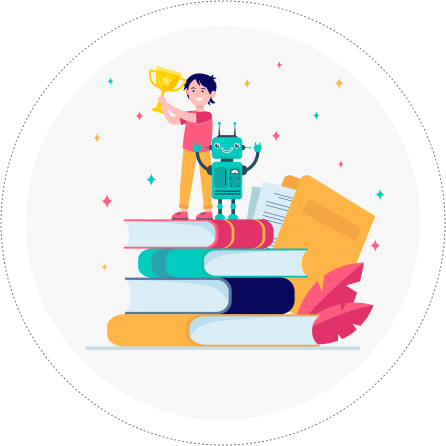Informatics Practices Class 11
- Home
- / Python Handay
- / Informatics Practices Class 11
Welcome!
Prerequisites
Before delving into Informatics Practices-11th, it’s essential to have a basic understanding of operating system and Basic Computer.
Learning Objectives
Students will acquire fundamental expertise in programming languages, MySQL, and computer systems, laying a solid foundation for advanced studies in the IT sector or pursuing degrees such as BCA, B.Sc(IT),BBA,B.Com thereby significantly enhancing career prospects in the field.
Course Overview
Module 1 : Computer Organization 10 Marks
- Introduction to computers and computing
- Evolution of computing devices
- Functioning components of a Computer system and their interconnections
- Types of Computer Memory & Units of memory
- Data deletion, its recovery and related security concerns.
- What Software and types of software.
Module 2: Python 25 Marks
- Types of Programming Language
- What is Python ? Advantage & Disadvantage of Python
- Application & Scope of Python
- Understanding Python IDLE and it’s Mode
- Writing First Program & Executing in Python IDLE
- Understanding I/O in Python
- Tokens
- Keyword & Identifiers
- Naming Rules of Identifiers
- Understanding Variable , Multi Assignments and Dynamic Typing
- Literals & Punnctuator
- Escape Sequence Character
- Expressions, Statement & Comments
- Extensive Live Programming Practice (Minimum 12 Programs)
- What is Data Type and its type
- Type Casting
- Understanding Mutable & Immutable Types
- What is Operators & its different types
- Expressions & Statements
- Precedence of Operators
- Evaluation of an expression
- Extensive Live Programming Practice (Minimum 12 Programs)
- Types of statement in python
- Sequence Flow Control
- Blocks & Indentation
- Conditional Statements and its types(if,if..else , elif)
- Understanding The range() function
- Iteration/ Looping Statements and its types(for , while)
- Loop else Statement
- Nested Loop
- break ,continue & pass keyword
Extensive Live Programming Practice (Minimum 30 Programs)
- What is List ?
- List Creating Ways & Indexing of List
- List Traversing Ways
- List Operators
- List Slicing
- Commonly Used Functions & Methods of List
- Nested List
- What is Dictionaries and its structure?
- Dictionaries Creating Ways
- Accessing element of dictionaries
- Dictionaries Traversing Ways
- Adding Single and Multiple value to dictionaries during run time
- Working of Membership Operator on dictionaries
- Commonly Used Function and Methods of Dictionary
- Prove that dictionary key is Immutable and Unique
- Operation on Dictionaries via Menu Driven
- Extensive Live Programming Practice (Minimum 21 Programs)
Create a small project integrating all concepts covered up to this point.
Module 3: Database Management Systems 30 Marks
- Introduction to database concepts
- Purpose of DBMS & Database Model
- Advantage and Disadvantage of DBMS.
- The relational model Terminology & Keys
- Introduction to MYSQL Databases System & Starting MYSQL
Classification of SQL Command
- SHOW ,USE, & Desc Command
- SELECT ,FROM ,WHERE , & DISTINCT Command
- Column Alias
- Operators in SQL
- Relational Operators
- Logical Operators
- Range Operators
- List Operators
- Like Operators
- Searching NULL Values
- Extensive Live Query Practice (Minimum 45 Query)
- SQL Data Types
- Creating Database & Tables
- SQL Constraints
- Inserting Record
- Updating Record
- Deleting Record
- Adding Column ,Removing Column and Changing Column Name
- Removing Database & Table
- Extensive Live Query Practice (Minimum 45 Query)
Module 4 : Emerging Trends 5 Marks
- Artificial Intelligence
- Machine Learning
- Natural Language Processing,
- Immersive experience (AR, VR), Robotics
- Big data and its characteristics
- Internet of Things (IoT), Sensors, Smart cities
- Cloud Computing and Cloud Services (SaaS, IaaS, PaaS)
- Grid Computing,
- Block chain technology.
Module 5: Deployment and DevOps
Lab Test of Python : 11 Marks
Lab Test of MySql : 07 Marks
Practical Report file: 07 Marks
Viva voce : 05 Marks
Enquiry Now
Our Courses
Data Analyst using Python
Select Tech MindGuru for Why ?
Placement Assistance
Placement assistance offered for a successful career.
Membership
Membership provided until the final examination.
Personalized Attention
Personalized attention provided to each student.

Get Course Certificate
Certificate awarded upon completion of the course.
Monthly Tests
Regular monthly test series for progress evaluation.
Latest CBSE Syllabus
Training modules aligned with the latest CBSE syllabus.
Frequently Asked Questions
Students interested in data handling, databases, and Python programming. It’s great for those wanting to explore data science and web development.
With regular practice in Python, data handling, and SQL, it is quite manageable.
IP teaches valuable skills in programming and databases, useful for careers in IT, data science, and web development.


